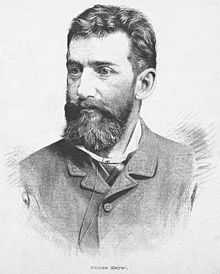Julius Zeyer
| Julius Zeyer | |
|---|---|
 Portrait of Julius Zeyer by Jan Vilímek | |
| Born |
26 April 1841 Prague, Austrian Empire |
| Died |
29 January 1901 (aged 59) Prague, Austria-Hungary |
| Resting place | Slavín |
| Occupation | Writer, poet |
| Nationality | Czech |
| Notable works |
Fantastické povídky Ondřej Černišev Román o věrném přátelství Amise a Amila Jan Maria Plojhar |
Julius Zeyer (April 26, 1841 – January 29, 1901) was a Czech prose writer, poet, and playwright.
Personal life
Zeyer was born in Prague, the son of Eleonora (née Weissel) and Jan Zeyer, a timber merchant.[1] His father came from French (Alsatian) nobility, and his mother was from a Jewish family, and had converted to Catholicism.[2][3] Zeyer learned the Czech language from his nanny. He was expected to take over the family's factory but instead decided to learn carpentering. Attempts to study high school and university were unsuccessful. During his life he frequently traveled in Europe and the Orient. After 1877 he moved to Vodňany, where he spent over a decade with literary work. Afterwards, he returned to Prague. He died in Prague.
Works
Zeyer's prose and poems are restless, nostalgic, mystical, depressive, and usually end tragically. He often blended foreign legends with national themes particular to Czech society and history.[4] Like the Decadents, his work often combines religious and erotic imagery. He was associated with the "Lumír" school, a group of writers that grouped around the magazine of the same name and took their influences from Western Europe, in particular France.[5]
Zeyer's epic poems, including Vyšehrad (1880), and Karolinská epopeja (1896), draw from Czech and French legends respectively, and celebrate the glorious past of ancients, compared to the bleak present. He took inspiration from the Czech, Russian, Irish, and French history. His novels describe persons trying to live a better life under the romantic ideals and people who find peace only at the moment of death. His semi-autobiographical novel Jan Maria Plojhar (1891) deals with the tragic nature of an artist. Zeyer's dramatic works were written in a similar style. His work “Tři legendy o krucifixu” (1895) uses the story of Christ’s crucifixion to explore themes of Czech Nationalism and the value of art.[6] The first story, “Inultus” follows the story of an Italian sculptress who attempts to create a realistic depiction of the crucifixion. The idea of an artist driven mad by their work is explored in the story and leads to the death of her model, a Czech vagabond named Inultus, whom she murders in a fit of creative insanity.
Josef Suk composed his Pohádka (Fairy Tale) on a play by Zeyer.
References
- ↑
- ↑
- ↑
- ↑ Naughton, James. "Czech Literature, 1774 to 1918". Oxford University. Retrieved 19 October 2012.
- ↑ Bolton, Jonathan. "Zeyer, Julius". YIVO Encyclopedia of Jews in Eastern Europe. Retrieved 19 October 2012.
- ↑ Richter, Vaclav. "Inultus - un conte pragois de Julius Zeyer". Radio Prague. Retrieved 19 October 2012.
External links
|